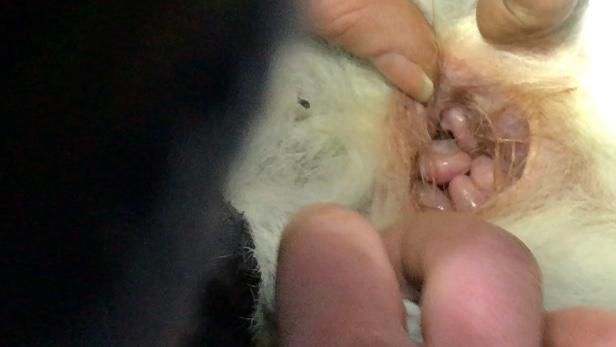Endangered Eastern Quolls Are Born on Mainland Australia for the First Time in 50 Years
Three of the feisty marsupials, which had been reintroduced to the wild, were found with joeys in their pouches
:focal(2232x1060:2233x1061)/https://tf-cmsv2-smithsonianmag-media.s3.amazonaws.com/filer/aa/04/aa048fce-4dc6-4133-9abc-87ba088d3102/black_quoll_a_nrobinson.jpg)
The eastern quoll, a cat-sized marsupial with pointy ears and speckled fur, was once found throughout south-eastern Australia. But disease and predation by foxes and feral cats devastated the species; quolls continue to exist on Tasmania, but in the early 1960s, they disappeared from the Australian mainland.
Fortunately, things are starting to look up for the carnivorous critters. As the BBC reports, conservationists were recently excited to learn that three female quolls that had been transferred from a Tasmanian wildlife sanctuary to Booderee National Park in New South Wales were hiding more than a dozen bean-sized babies in their pouches. This happy discovery marks the first time in more than 50 years that eastern quolls have been born in the wild on mainland Australia.

Twenty quolls fitted with GPS collars were set free in Booderee in March. Though Booderee was selected because it has a naturally protected peninsula and the national park has been working for the last 15 years to control its fox numbers, at least three quolls are believed to have met an unfortunate end at the paws of foxes, according to Rewilding Australia, a conservation group involved in the effort to reintroduce the animals to the wild on the mainland. Others were killed by pythons, cars and a pet dog. By June, only six out of the 20 quolls survived.
But the new quoll joeys indicate that despite its setbacks, the rewilding program has been a success. "We've proven the quolls can find food, shelter and breed,” Natasha Robinson, a researcher at the Australian National University, tells the AFP. “We've also shown a capacity to make changes to improve the quolls’ survival rate.”
A total of 15 tiny quoll babies have been born to three mothers. Each has five joeys tucked into her pouch, which is another encouraging sign; eastern quolls can carry up to six babies, but five is considered “very successful,” according to Nick McLaren of Australia’s ABC News.
The babies will stay inside their mothers’ pouches for a total of three months. If all goes well, they will then venture out into the world and travel long distances looking for food. Quoll primarily eat insects, but they will also chow down on rabbits, mice, rats and small snakes.
Conservationists are so encouraged by the birth of the joeys that they are planning to introduce up to 40 more quolls from Tasmania to the mainland next year, reports Blake Foden of the Sydney Morning Herald. Nick Dexter, Booderee National Park’s natural resource manager, tells Elfy Scott of Buzzfeed News that the new babies “give us hope that there is a future for these feisty little marsupials back on the mainland where they belong.”